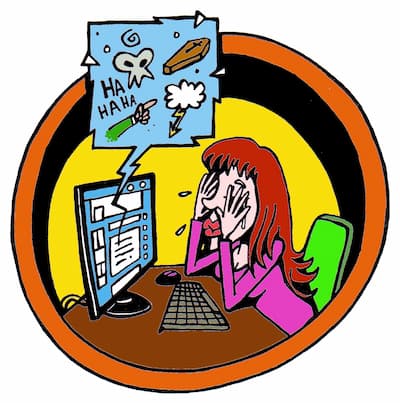Als je online pesten ziet, is het belangrijk om te doen wat je kunt om het te stoppen. Soms is het verleidelijk om te denken dat als jij niet de persoon bent die iets verkeerd doet, je geen rol kan spelen om dingen recht te zetten. Als je weet dat iemand opzettelijk problemen voor iemand anders veroorzaakt, moet je doen wat je kunt om het te stoppen - soms kan een kleine actie voorkomen dat het erger wordt. Het doorgeven van informatie is niet zo onschuldig als het lijkt - je wordt erin gelokt om een actieve speler te worden in een smerig spel.
Waarom is dit belangrijk

- Pestkoppen gedijen op de stilte van andere mensen. Volgens onderzoek van de Edith Cowan University bleek dat leeftijdsgenoten aanwezig zijn als toeschouwers in 87% van de pestincidenten.
- Door het te weten en niets te zeggen, laat je het gebeuren.
- Je zou willen dat iemand anders voor je opkomt als je gepest wordt.
- De meeste mensen die online pesten, pesten ook offline: wat onschuldig lijkt ('het is maar een website!') kan een negatieve invloed hebben op het emotionele en fysieke welzijn, vriendschappen en andere relaties.
- Wanneer meer mensen positieve actie ondernemen, ontstaat er een cultuur waarin pesten (online of offline) niet acceptabel is en worden mensen aangemoedigd om op meer positieve manieren aandacht te zoeken.
Het advies - Wees een actieve omstander
Als je weet dat iemand problemen veroorzaakt, vertel hem dan waarom hij zou moeten stoppen. Als u zich niet veilig voelt om zelf iets te zeggen, vertel het dan aan iemand die actie kan ondernemen. Zelfs als de persoon die slecht wordt behandeld niet je vriend is, verdienen ze het niet om het slachtoffer te worden van zaken als roddels en homofobie.
Creëer de wereld waarin je wilt leven - online & offline
Je hebt de macht om gedrag dat je oneerlijk vindt te kortsluiten - weiger deel uit te maken van de intimidatie en vertel mensen waarom.
Word geen 'onderdeel' van pesten
Jij bent misschien niet degene die de gemene dingen over een ander is gestart, maar zelfs het doorsturen van informatie die jij ontvangt aan anderen maakt jou medeplichtig.
- - - - -
But I didn’t do it
If you see online bullying, it is important to do what you can to stop it.
What’s the issue?
Sometimes it’s tempting to think that if you aren’t the person doing something wrong, you don’t have a role to play in setting things right. If you know someone is deliberately causing problems for somebody else, you should do what you can to stop it—sometimes just a small action can prevent things getting worse. Passing on information isn’t as innocent as it seems—you are being drawn in to becoming an active player in a nasty game.
Why does it matter?
- Bullies thrive on other people’s silence. According to research by the Edith Cowan University (2009) frequent school bullying is highest among Year 5 (32%) and Year 8 (29%) students. The same research found that peers are present as onlookers in 87% of bullying incidents. By knowing about it and not saying anything you are allowing it to happen.
- You would want someone else to speak up for you if you were being bullied.
- Most people who bully online also bully offline: what might seem harmless (‘it’s just a website!’) can have a negative impact on people’s emotional and physical wellbeing, friendships and other relationships.
- When more people take positive action it creates a culture where bullying (online or offline) is not acceptable and encourages people to look for attention in more positive ways.
Advice
Be an active bystander
- If you know someone is causing problems, tell them why they should stop. If you don’t feel safe to say something yourself, tell someone who can take action.
- Even if the person being treated badly isn’t your friend, they don’t deserve to be the victim of things like gossip and homophobia.
Create the world you want to live in—online and offline
- You have the power to short-circuit behaviour that you think is unfair—refuse to be part of the harassment, and tell people why.
Don’t become an ‘accessory’ to bullying
You may not be the one who has initiated some sort of campaign about another person, but even forwarding information you receive to others makes you complicit.
The Department of Education and Training (DET) encourages the dissemination and re-use of information provided on this website. The State of Victoria owns the copyright in all material produced by the DET. For licence conditions, refer to: Creative Commons Attribution 4.0 international licence


